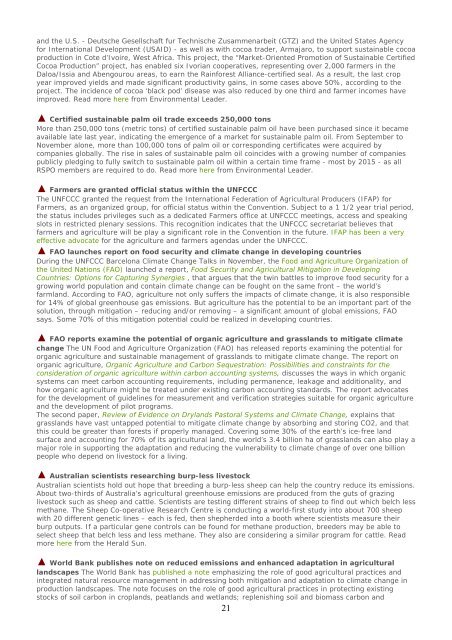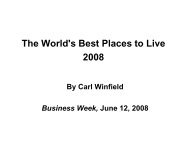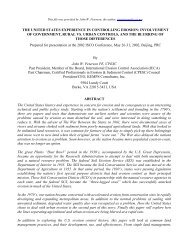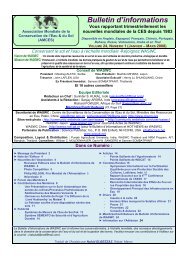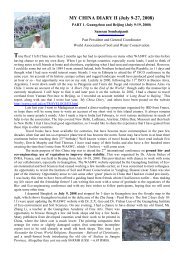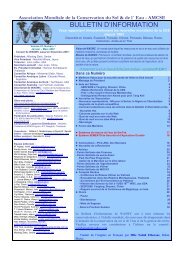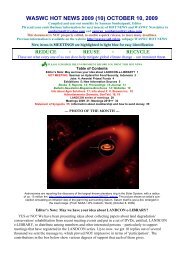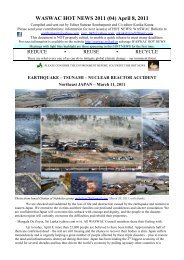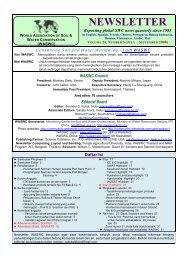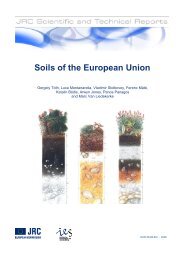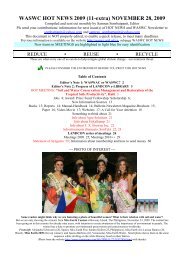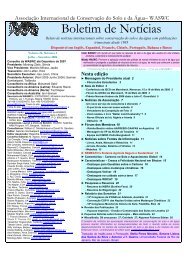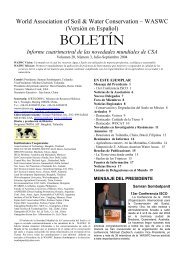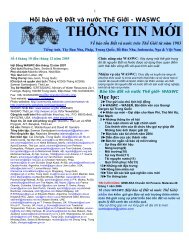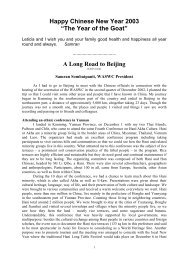April 30, 2010 - World Association of Soil and Water Conservation
April 30, 2010 - World Association of Soil and Water Conservation
April 30, 2010 - World Association of Soil and Water Conservation
You also want an ePaper? Increase the reach of your titles
YUMPU automatically turns print PDFs into web optimized ePapers that Google loves.
<strong>and</strong> the U.S. - Deutsche Gesellschaft fur Technische Zusammenarbeit (GTZ) <strong>and</strong> the United States Agencyfor International Development (USAID) - as well as with cocoa trader, Armajaro, to support sustainable cocoaproduction in Cote d’Ivoire, West Africa. This project, the “Market-Oriented Promotion <strong>of</strong> Sustainable CertifiedCocoa Production” project, has enabled six Ivorian cooperatives, representing over 2,000 farmers in theDaloa/Issia <strong>and</strong> Abengourou areas, to earn the Rainforest Alliance-certified seal. As a result, the last cropyear improved yields <strong>and</strong> made significant productivity gains, in some cases above 50%, according to theproject. The incidence <strong>of</strong> cocoa ‘black pod’ disease was also reduced by one third <strong>and</strong> farmer incomes haveimproved. Read more here from Environmental Leader.▲ Certified sustainable palm oil trade exceeds 250,000 tonsMore than 250,000 tons (metric tons) <strong>of</strong> certified sustainable palm oil have been purchased since it becameavailable late last year, indicating the emergence <strong>of</strong> a market for sustainable palm oil. From September toNovember alone, more than 100,000 tons <strong>of</strong> palm oil or corresponding certificates were acquired bycompanies globally. The rise in sales <strong>of</strong> sustainable palm oil coincides with a growing number <strong>of</strong> companiespublicly pledging to fully switch to sustainable palm oil within a certain time frame - most by 2015 - as allRSPO members are required to do. Read more here from Environmental Leader.▲ Farmers are granted <strong>of</strong>ficial status within the UNFCCCThe UNFCCC granted the request from the International Federation <strong>of</strong> Agricultural Producers (IFAP) forFarmers, as an organized group, for <strong>of</strong>ficial status within the Convention. Subject to a 1 1/2 year trial period,the status includes privileges such as a dedicated Farmers <strong>of</strong>fice at UNFCCC meetings, access <strong>and</strong> speakingslots in restricted plenary sessions. This recognition indicates that the UNFCCC secretariat believes thatfarmers <strong>and</strong> agriculture will be play a significant role in the Convention in the future. IFAP has been a veryeffective advocate for the agriculture <strong>and</strong> farmers agendas under the UNFCCC.▲ FAO launches report on food security <strong>and</strong> climate change in developing countriesDuring the UNFCCC Barcelona Climate Change Talks in November, the Food <strong>and</strong> Agriculture Organization <strong>of</strong>the United Nations (FAO) launched a report, Food Security <strong>and</strong> Agricultural Mitigation in DevelopingCountries: Options for Capturing Synergies , that argues that the twin battles to improve food security for agrowing world population <strong>and</strong> contain climate change can be fought on the same front – the world’sfarml<strong>and</strong>. According to FAO, agriculture not only suffers the impacts <strong>of</strong> climate change, it is also responsiblefor 14% <strong>of</strong> global greenhouse gas emissions. But agriculture has the potential to be an important part <strong>of</strong> thesolution, through mitigation – reducing <strong>and</strong>/or removing – a significant amount <strong>of</strong> global emissions, FAOsays. Some 70% <strong>of</strong> this mitigation potential could be realized in developing countries.▲ FAO reports examine the potential <strong>of</strong> organic agriculture <strong>and</strong> grassl<strong>and</strong>s to mitigate climatechange The UN Food <strong>and</strong> Agriculture Organization (FAO) has released reports examining the potential fororganic agriculture <strong>and</strong> sustainable management <strong>of</strong> grassl<strong>and</strong>s to mitigate climate change. The report onorganic agriculture, Organic Agriculture <strong>and</strong> Carbon Sequestration: Possibilities <strong>and</strong> constraints for theconsideration <strong>of</strong> organic agriculture within carbon accounting systems, discusses the ways in which organicsystems can meet carbon accounting requirements, including permanence, leakage <strong>and</strong> additionality, <strong>and</strong>how organic agriculture might be treated under existing carbon accounting st<strong>and</strong>ards. The report advocatesfor the development <strong>of</strong> guidelines for measurement <strong>and</strong> verification strategies suitable for organic agriculture<strong>and</strong> the development <strong>of</strong> pilot programs.The second paper, Review <strong>of</strong> Evidence on Dryl<strong>and</strong>s Pastoral Systems <strong>and</strong> Climate Change, explains thatgrassl<strong>and</strong>s have vast untapped potential to mitigate climate change by absorbing <strong>and</strong> storing CO2, <strong>and</strong> thatthis could be greater than forests if properly managed. Covering some <strong>30</strong>% <strong>of</strong> the earth’s ice-free l<strong>and</strong>surface <strong>and</strong> accounting for 70% <strong>of</strong> its agricultural l<strong>and</strong>, the world’s 3.4 billion ha <strong>of</strong> grassl<strong>and</strong>s can also play amajor role in supporting the adaptation <strong>and</strong> reducing the vulnerability to climate change <strong>of</strong> over one billionpeople who depend on livestock for a living.▲ Australian scientists researching burp-less livestockAustralian scientists hold out hope that breeding a burp-less sheep can help the country reduce its emissions.About two-thirds <strong>of</strong> Australia’s agricultural greenhouse emissions are produced from the guts <strong>of</strong> grazinglivestock such as sheep <strong>and</strong> cattle. Scientists are testing different strains <strong>of</strong> sheep to find out which belch lessmethane. The Sheep Co-operative Research Centre is conducting a world-first study into about 700 sheepwith 20 different genetic lines – each is fed, then shepherded into a booth where scientists measure theirburp outputs. If a particular gene controls can be found for methane production, breeders may be able toselect sheep that belch less <strong>and</strong> less methane. They also are considering a similar program for cattle. Readmore here from the Herald Sun.▲ <strong>World</strong> Bank publishes note on reduced emissions <strong>and</strong> enhanced adaptation in agriculturall<strong>and</strong>scapes The <strong>World</strong> Bank has published a note emphasizing the role <strong>of</strong> good agricultural practices <strong>and</strong>integrated natural resource management in addressing both mitigation <strong>and</strong> adaptation to climate change inproduction l<strong>and</strong>scapes. The note focuses on the role <strong>of</strong> good agricultural practices in protecting existingstocks <strong>of</strong> soil carbon in cropl<strong>and</strong>s, peatl<strong>and</strong>s <strong>and</strong> wetl<strong>and</strong>s; replenishing soil <strong>and</strong> biomass carbon <strong>and</strong>21


